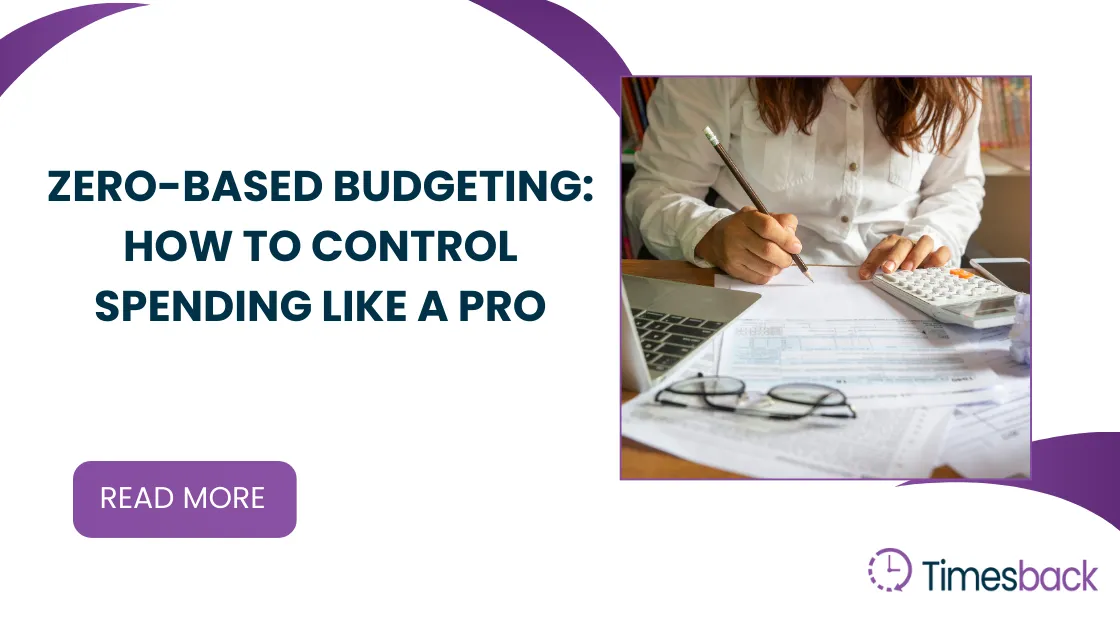Zero-Based Budgeting: How to Control Spending Like a Pro

Money doesn’t manage itself—you do.
Anúncios
If you’re tired of vague budgets that leave you wondering where your paycheck disappeared, zero-based budgeting (ZBB) might be your financial game-changer.
Unlike traditional budgeting, where past spending dictates future limits, ZBB forces you to justify every dollar before it leaves your wallet.
The result? Laser-focused control over your finances.
Anúncios
A 2022 study by Deloitte found that companies using zero-based budgeting reduced operational costs by 10–25% annually.
But this strategy isn’t just for corporations—it’s a powerhouse for personal finance, too.
Whether you’re drowning in debt or optimizing savings, ZBB ensures no dollar goes unassigned.
Furthermore, implementing ZBB can lead to a more mindful approach to spending.
By actively engaging with your finances, you can identify areas where you might be overspending or under-saving, allowing for more informed decisions moving forward.
Additionally, ZBB encourages a deeper understanding of your financial habits.
As you analyze your spending patterns, you may discover insights that help you prioritize your financial goals more effectively.
Why Traditional Budgets Fail (And How ZBB Fixes It)
Most budgets operate on autopilot.
You allocate rough estimates for groceries, rent, and entertainment, then hope for the best.
The problem? Hope isn’t a strategy.
Overspending in one category silently drains another, leaving you frustrated when goals slip away.
Zero-based budgeting flips the script.
Instead of rolling over last month’s numbers, you start from zero—assigning every dollar a purpose before the month begins.
Missed a savings goal last time? Now you’ll see exactly why and adjust.
Additionally, ZBB allows for a more proactive approach to managing your finances.
You can anticipate changes in income or expenses and adjust your budget accordingly, rather than reacting to financial surprises as they occur.
This proactive mindset can lead to improved financial resilience, as you become better equipped to handle unexpected expenses.
Moreover, ZBB fosters a sense of ownership over your financial decisions, empowering you to take control of your financial future.
Table 1: Traditional Budget vs. Zero-Based Budget
| Category | Traditional Budget | Zero-Based Budget |
|---|---|---|
| Approach | Based on past spending | Starts fresh each month |
| Flexibility | Rigid categories | Dynamic allocations |
| Spending Control | Reactive adjustments | Proactive planning |
| Savings Growth | Often inconsistent | Deliberate & measurable |
The Step-by-Step Blueprint to Mastering ZBB
1. Track Every Dollar In (Yes, Every Single One)
Before assigning expenses, know your exact income.
Include salaries, side hustles, and even that $20 from selling old books.
If it’s money, it gets a job.
Tracking every cent helps you understand your financial landscape better.
It also empowers you to make informed decisions about where to allocate your funds effectively.
Moreover, having a clear picture of your income can help you identify potential areas for increasing your earnings.
Consider exploring new side hustles or passive income streams that align with your skills and interests.
+ Lessons from the Titans: What Successful Entrepreneurs Do Differently
2. List Fixed and Variable Expenses
Fixed costs (rent, insurance) are non-negotiable.
Variables (dining out, hobbies) are where ZBB shines—cut or expand based on priorities.
Categorizing your expenses helps in recognizing patterns in your spending habits.
This awareness can lead to smarter financial choices and prioritization of essential expenses.
Additionally, understanding your fixed and variable expenses can help you make informed decisions during financial crunches.
If unexpected expenses arise, you’ll know where you can adjust your variable costs without sacrificing your quality of life.

3. Assign Dollars Until You Hit Zero
This isn’t about restriction; it’s about intention.
Allocate funds until income minus expenses equals $0.
Leftover cash? Redirect it to debt or investments.
This method encourages a mindset shift from viewing budgeting as a chore to seeing it as a strategic tool for achieving your goals.
You’ll find yourself more engaged in the process, leading to better financial outcomes.
Furthermore, the discipline of assigning every dollar can create a sense of accomplishment as you see your financial goals being met.
This practice can also motivate you to set new goals, whether they involve saving for a vacation, a new car, or retirement.
4. Monitor and Adapt Weekly
Life changes, and so should your budget.
Weekly check-ins prevent surprises and keep spending aligned with goals.
Regular monitoring allows for immediate adjustments, ensuring you stay on track.
It also provides a sense of accomplishment as you see your financial goals come to fruition over time.
Moreover, these check-ins can help you identify trends in your spending habits, allowing for more accurate future budgeting.
By regularly reviewing your budget, you can also celebrate small wins, reinforcing positive financial behaviors.
The Psychology Behind Zero-Based Budgeting’s Success
ZBB isn’t just math—it’s behavioral finance in action.
By requiring active decision-making, it eliminates mindless spending.
A study in the Journal of Consumer Research found that people who budget this way save 23% more than those using traditional methods.
This increased savings rate can be attributed to the heightened awareness and accountability that ZBB fosters.
When you actively engage in allocating your money, you develop a stronger relationship with your finances.
Additionally, understanding the psychological triggers behind spending can help you make more conscious decisions.
Recognizing emotional spending patterns can empower you to break free from unhealthy financial habits.

Table 2: Monthly ZBB Allocation Example
| Category | Allocation ($) | Purpose |
|---|---|---|
| Rent/Mortgage | 1,200 | Fixed necessity |
| Groceries | 400 | Adjusted for meal planning |
| Debt Repayment | 300 | Aggressive payoff strategy |
| Entertainment | 150 | Controlled guilt-free spending |
| Savings | 500 | Emergency fund boost |
| Total | 2,550 | Income = Expenses |
++ The Art of Negotiation: Save More, Earn More
Common Pitfalls (And How to Avoid Them)
- Overcomplicating: Start broad, then refine.
- Ignoring Irregular Expenses: Annual bills? Divide by 12 and save monthly.
- Guilt-Driven Cuts: Budget for joy—burnout kills financial discipline.
Recognizing these pitfalls can help you maintain a sustainable budgeting practice.
By being aware of common mistakes, you can navigate your financial journey more effectively.
Additionally, seeking support from financial communities or resources can provide motivation and accountability.
Surrounding yourself with like-minded individuals can inspire you to stay committed to your budgeting goals.
Final Word: Is Zero-Based Budgeting Right for You?
If you crave precision, accountability, and faster financial progress, ZBB is worth the effort.
It’s not about deprivation—it’s about making money work smarter, not harder.
Ready to reset your spending?
Start at zero.
